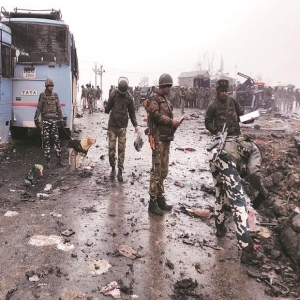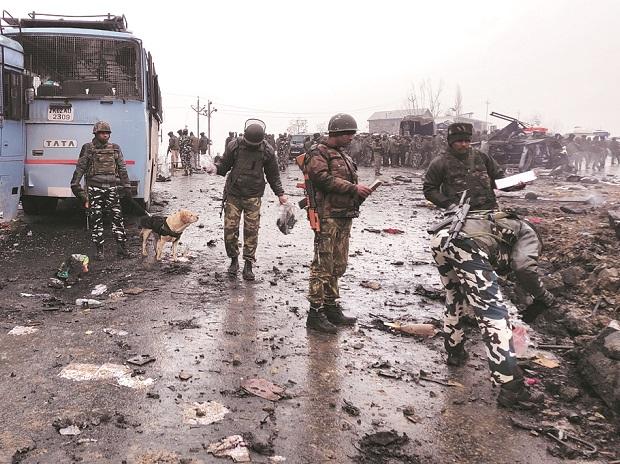

The relationship between India and Pakistan has been strained since its inception. Despite India's efforts to foster amicable relations, these attempts have proven fruitless. Pakistani terrorists have consistently sought to infiltrate India, inflicting harm upon its citizens, with the Pahalgam attack being one such incident. There is significant tension between the two nations, creating a situation akin to a full-blown war.
In Pahalgam, the terrorists asked the names of the tourists, and the men with non-Muslim names were fired at. It's not because the terrorists loved Indian Muslims, but it's because they knew that religion is an atom bomb in India. Their objective was to instigate an internal conflict within India, turning Hindus against Muslims.
Historical evidence clearly indicates that the Hindu-Muslim discord was a strategic manoeuvre employed by the British to undermine India's unity. By leveraging this tactic, they maintained control over India for twenty decades.
The Indian Rebellion of 1857, referred to as the Sepoy Mutiny, exemplifies the collaboration of Hindus and Muslims in their struggle against the East India Company for independence. This uprising threatened the Company's dominance in India, leading to the transfer of power to the British crown.
The British were acutely aware that a united Indian populace would pose a significant challenge to their rule. Consequently, they employed a divide-and-rule strategy, fostering divisions among Indians based on religious lines. They instilled hatred in the minds of Hindus towards Muslims and created a sense of insecurity among Muslims in Hindu-majority regions, ultimately resulting in the partition of India into Hindustan and Pakistan.
In Pahalgam, the terrorists intentionally asked the names of the victims before firing them because they wanted to create a feeling in the minds of Indians that the Muslims killed the Hindus, and that would naturally cause the Hindus to turn against the Muslims.
At this moment of tension, we, the Indians, should be united irrespective of all boundaries and diversities. Our political ideology, religion, language, culture, or values may be different, but we should be united at this time as Indians. The enemy wants to see a division among us, the Indians. But this is an opportunity for us to demonstrate our solidarity and mutual support.
After the Pahalgam attack, we see a trend of hate in some Hindus towards Muslims. We have to realise that not all Muslims are terrorists and at the same time, not all Hindus are patriotic as well. We cannot ignore the fact that there are external as well as internal enemies who always wish and try to divide the citizens based on religion and portray them as anti nationalists for their vested interests.
When we go back to the history of India, we understand that the battles fought on the Indian continent were not on the basis of religion, but because of the greed for power. At present, there is a political interest in India to project all the Muslim rulers of history as cruel and persecutors of Hindus, which is not true.
The First Battle of Panipat was fought between Babur, the founder of the Mughal Empire, and Ibrahim Lodi, the Sultan of Delhi, on April 21, 1526. Both were Muslims. The Battle of Patan was fought on June 20, 1790, between the Maratha Kingdom of Gwalior, backed by Peshwa and Holkar, and an alliance of Rajput kingdoms, including Jaipur and Jodhpur. In the Battle of Haldighati, the Mughal Emperor Akbar's army was led by Raja Man Singh, a Hindu, and Hakim Khan Suri, a Muslim, commanded a unit of Maha Rana Pratap's forces. During the reign of Akbar, Holi was celebrated in the Mughal courts. These are examples of Hindu Muslim unity in India.
The All India Muslim League was founded on December 30, 1906, to represent the political interests of Muslims in British India. The Morley-Minto Reforms were enacted through the Indian Councils Act of 1909, which introduced separate electorates for Muslims. A section of Hindus was not happy with it, and in 1915, Akhil Bharatiya Hindu Mahasabha was founded to advocate the interests of the Hindus. The British taught a distorted version of history that the Muslim kings always persecuted the Hindus. The Muslims, as well as the Hindus, were scared that the other would take control of the nation. This fear was converted into hatred, and the hatred was transformed into riots and the partition of India. The British were successful in their strategy of divide and rule.
In the Pahalgam attack, the terrorists have taken the strategy of divide and destroy. They tried to drop the same atom bomb that the British had dropped in India, the atom bomb of religion. Let's not become prey to them. Let's show our unity as Indians, as brothers and sisters.